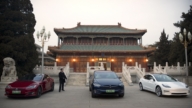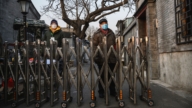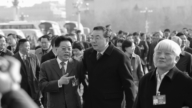【新唐人2013年08月14日訊】早前有香港媒體透露,中共北戴河會議上將有一暗一明兩條主線:暗線是薄熙來案;明線是中共三中全會的經濟改革方案。而被中共總理李克強看做自己的「孩子」一樣的《上海自由貿易試驗區總體方案》卻遭到了中共內部不同利益集團的強烈反對。外界觀察,在這次北戴河會議上,中共高層各派爭奪的不僅是薄熙來的死活,還圍繞著李克強的經濟改革方案進行激烈的博弈。「李克強的孩子」是否會胎死腹中,北戴河會議上是否會因此「打破頭」,我們來看專家的分析。
中共喉舌《中新網》曾報導,李克強7月3號主持召開的國務院常務會議中,原則上通過了《中國(上海)自由貿易試驗區總體方案》。
不過,大陸媒體8月5號引述香港《南華早報》的報導卻出現了不同的聲音。報導指稱,「上海自貿實驗區」執行方案至今未公布,部分原因在於「上海自貿區」與國內現行法律存在著部分衝突。提出必須先修補「法律漏洞」,才能宣佈自貿區細則。
但讓人奇怪的是,中共商務部新聞發言人瀋丹陽8月7號在接受媒體採訪時表示,「上海自貿區」建設是下半年區域經濟發展重點,自貿區總體方案很快將正式審定批准公布。
被一位政府消息人士形容為「李克強的孩子」的「上海自由貿易區」,是「李克強經濟學」的一部分,但卻受到中國銀監會和中國證監會的強烈反對。香港《南華早報》引述了解中共高層會議一手內幕的三位消息人士的消息,指稱,在一次國務院閉門會議上,李克強曾為此拍桌子發火。
經濟評論專家傑森:「當李克強提出來,我能不能放鬆一點,我們在上海搞一個『自由貿易區』,把銀行金融管制在這個貿易區裡稍微放鬆一點,受到了巨大的阻力。實際上這個利益集團,它就是這樣一個屬性。它只能不斷的加大它的利益進去,絕不可能有任何讓利的因素。」
在北戴河會議期間,同樣放風出不和諧音的,還有「國企改革」。
直屬中共國務院的中央級黨報,北京《經濟日報》近日連發5篇文章「解析國企改革熱點」。文章說,國企不能私有,否則必將動搖中國根基。又說俄羅斯當年「均分國資」的後果,導致了重大經濟災難。
北京社會經濟科學研究所所長陳子明:「蘇聯是把國有資產『全民股份化』了。現在中國學者提的還沒到這一步。這些提法我覺得都是很正常的。各個國家,包括中國的香港、澳門,都在廣泛採用。談不上『導致國家崩潰』這些聳人聽聞的說法。」
香港《明報》10號的文章翻出了,大陸招商局集團前董事長、太子黨秦曉,2010年在清華大學發表的演說。秦曉當時就提出了「應有序、公平地將龐大的國有資產分散到民眾手中」。
實際上,中國經濟學界很多人,包括著名經濟學家吳敬璉、楊帆等都提出過這一觀點。
傑森:「李克強剛上臺,信誓旦旦的要放棄歷史上的這種刺激。然後銀行就給他下馬威,就搞『錢荒』,整個經濟開始走緩,致使他不得不開始又『保7』。所以說,整個中國實際上是被歷史上形成的利益集團在控制著。各個官員,他只是在利益集團之間,試圖想平衡一下關係。」
不過,即使李克強之前為「上海自由貿易區」怒拍桌子,在北戴河會議上,也將就經濟措施力排眾議,仍然被認為沒有觸及到中國經濟需要改革的根本。
傑森:「不是說,是真的把現有的中共利益集團的資產分給老百姓。他們根本這連談都不會談的。他們所謂談的是,讓它不要像現在這樣,搞的這麼瘋狂。」
許多海外分析師認為,經濟改革在胡溫執政時陷入停滯,新一屆領導現急於重啟改革。否則經濟下滑將引發民眾不滿,從而可能導致中共失去領導權。
採訪/劉惠 編輯/尚燕 剪輯/李勇
Internal Conflicts Reported in Beidaihe Meeting
Hong Kong media has revealed the Chinese Communist
Party (CCP) Beidaihe meeting will have two main threads.
The hidden thread is the Bo Xilai case; and the visible
thread is the Third Plenum of the CCP economic reforms.
Shanghai Free Trade Area (FTA) is deemed
the brain-child of Chinese Premier Li Keqiang.
This project has been strongly opposed
by different interest groups within the CCP.
Outside observers commented that during the
Beidaihe meeting, the CCP leadership factions
are not only competing over Bo’s life or death.
They are also fighting about Li Keqiang’s economic reforms.
Will Li Keqiang’s program come to fruition? Will they resolve
problems in the Beidaihe meeting? Let’s look at the reports.
CCP state-controlled China News Network
has reported that Li Keqiang chaired a
State Council executive meeting on July 3.
He has adopted China (Shanghai) FTA Program.
However, the mainland Chinese media quoted news
from the South China Morning Post on August 5.
There were different angles appearing.
Reports alleged that Shanghai FTA experimental
zone executive program has not been released.
This is, in part, because the Shanghai Free Trade Zone
has come into conflict with the existing domestic laws.
It is said that legal loopholes must be fixed
first before declaring free trade area rules.
CCP Ministry of Commerce spokesman Shen Danyang
commented during an interview on August 7.
Construction of the Shanghai FTA is a priority of regional
economic development during the second half of the year.
The FTA overall program will soon be officially approved.
Shanghai FTA was described as Li Keqiang’s
brain-child by a government informant.
It was part of Li Keqiang economic reform, but faces strong
opposition by the China Banking Regulatory Commission.
It also faces opposition from the China
Securities Regulatory Commission.
South China Morning Post quoted three first-hand
informants within the CCP high-level meeting.
They alleging that during a closed-door meeting
of the State Council, Li Keqiang got angry about it.
Jason Ma, Economic Review Expert:
“Li Keqiang proposed relaxing a little bit,
and forming a Shanghai free trade zone.
He wanted to relax the banking and financial regulations
in this zone, but encountered a lot of opposition.
This interest groups has such an attribute.
It can only continue to increase its interests,
but absolutely will not give away any.”
During the Beidaihe meeting, proposed reform of
state-owned enterprises also had disagreements.
The Economic Daily in Beijing, directly under the CCP
Central State Council, recently released five articles.
They “analyzed SOE reform hotspots," and said that
state-owned enterprises cannot be privately owned.
Otherwise, it will shake the foundation of China.
It also said sharing state-owned enterprises
in Russia led to a major economic disaster.
Chen Ziming, Head of the Institute of
Socio-Economic Sciences in Beijing:
“The Soviet Union made state-owned
assets into national demutualization.
Now Chinese scholars have not mentioned
this step. I think these comments are normal.
It is widely used in various countries, including Hong Kong
and Macao in China. It won’t cause state collapse.”
Ming Pao in Hong Kong recalled a speech from
princeling ,Qin Xiao at Tsinghua University, in 2010.
Qin is the former Chairman of China Merchant Group.
Qin mentioned at that time that “it should orderly and
equitably distribute huge state-owned assets to people.”
Many in Chinese economic circles have put forward this
view, including famous economists Wu Jinglan and Yang Fan.
Jason Ma: “Li Keqiang just took office, and
vowed to give up this historical hangover.
Then banks opposed him, and created money
shortages, and the economy started to slow.
This caused him to have to start to keep the seven rules.
So the economy of China is actually being
controlled by interest groups formed in history.
Various officials are just between different
interest groups, and are trying to balance it.”
Li Keqiang became angry with the issues
over the Shanghai Free Trade Area.
He will be against all the odds at the Beidaihe
meeting for his economic measures.
However, it is still considered that it does not touch
the fundamental needs of China’s economic reform.
Jason Ma: “It’s not really to distribute assets of the
existing interests groups of the CCP to the people.
They would not even talk about that. What they
talked about was not to be more considered.”
Many foreign analysts believe that economic reforms
were stalled when Hu and Wen were in power.
The new leaders are eager to restart reforms.
Otherwise, the economic downturn will lead to public
discontent, and make the CCP leadership weaken.



























